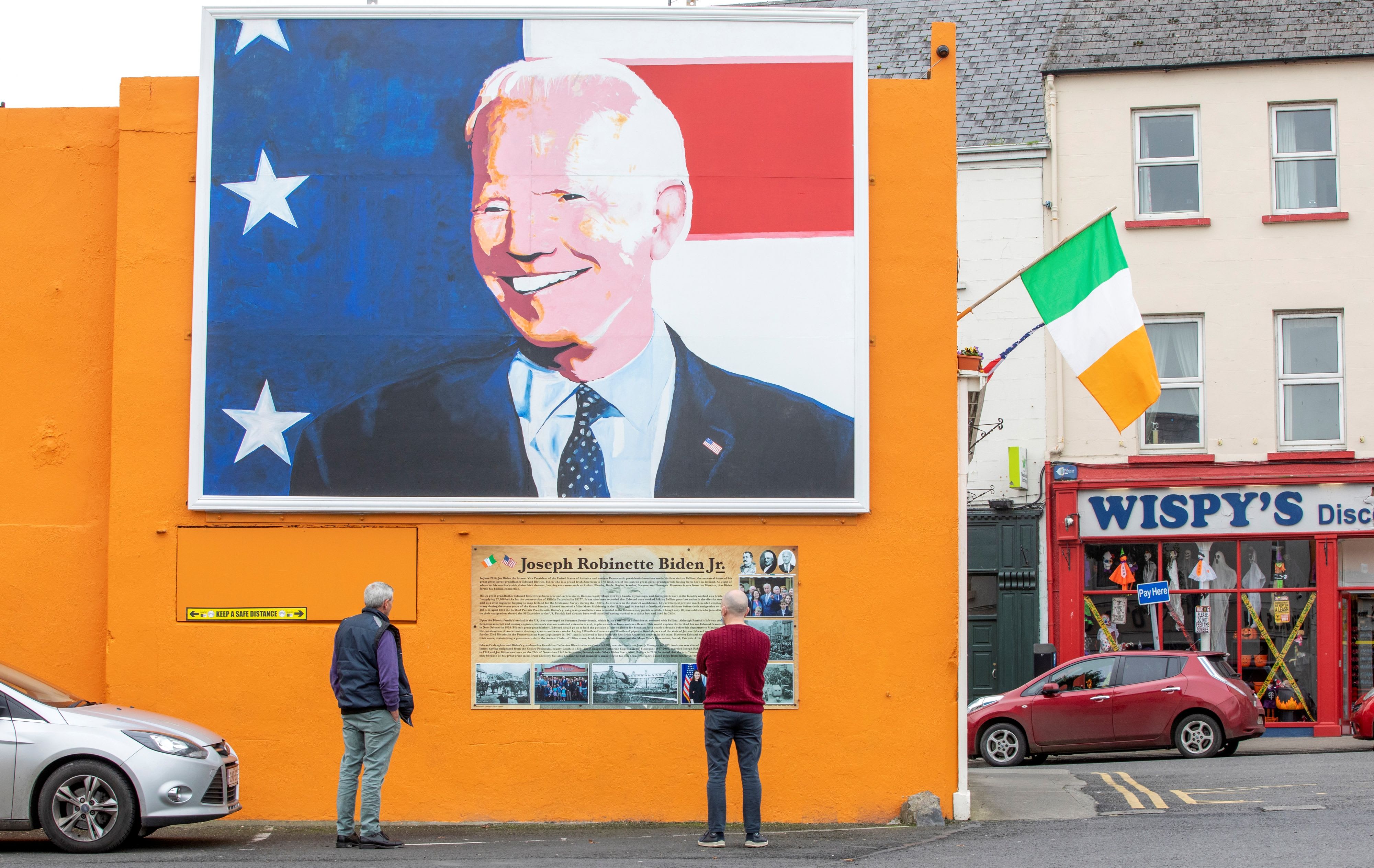
Pedestrians read an information board beneath a giant painting of US Presidential candidate Joe Biden, erected in his ancestral home of Ballina, north west Ireland, on October 7, 2020.
Paul Faith | Getty Images
DUBLIN — Ballina, a town in County Mayo in the west of Ireland, recently unveiled a striking mural in its town center of a familiar face: Joe Biden.
The Democratic presidential candidate has Irish-American heritage that traces back to the county which he has visited twice, in 2016 and 2017, to pay homage to his family roots.
Biden’s Irish ancestry and its links to the U.S. can be traced back to the mid-1800s, shortly after the devastating Great Irish Famine killed over a million people and forced many more to emigrate. His great-great-grandfather Patrick Blewitt left Ballina for Pennsylvania, and another ancestor, Owen Finnegan, left Louth for New York; the two lineages would connect in 1909 through marriage.
Biden has not been reluctant to bring up his ancestry in his quest for the White House — echoing Barack Obama, whose ancestry can be traced to County Offaly, and arguably the most famous Irish-American president John F. Kennedy — in courting the Irish-American vote.
It’s a connection to the country that his opponent, current President Donald Trump isn’t able to claim, unless his golf course counts.
The links have become prominent parts of Biden’s election campaign, most notably when it comes to Brexit and the accompanying issue of maintaining peace in Northern Ireland.
A Biden campaign statement in recent weeks said he will “ensure that there will be no U.S.-U.K. trade deal if the implementation of Brexit imperils the Good Friday Agreement.” This peace deal, which was signed in 1998, was brokered by the U.S. and ended decades of sectarian violence in Northern Ireland and the Republic.
He also committed to legislate a “roadmap to citizenship” for undocumented Irish people in the U.S.
Ireland and the U.S. have a storied past together but it is a relationship that is evolving and the outcome of November’s election will dictate the shape that it takes.
“I think we would expect a President Biden to be much more pro-European, pro-transatlantic relations than we’ve seen from the Trump White House,” Tina Fordham, head of global political strategy at Avonhurst, told CNBC.
The outcome of any U.S.-U.K. trade deal would depend on the U.S. Congress, and House Speaker Nancy Pelosi holds a similar position on the Good Friday Agreement as Biden.
“I have no doubt that Ireland would feel like it has more of a friend in the White House but it’s a combination of the White House and Congress in that case. Even under a second term for President Trump, there would be that attention to upholding the Good Friday Agreement,” Fordham added.
Trade and tax
For Ireland, its links with the U.S. are pivotal, especially for its economy and attracting foreign direct investment. Several major American tech companies, like Apple and Google, and pharmaceutical and medical-device manufacturers have significant bases in Ireland.
Frank Barry, professor of international business and economic development at Trinity College Dublin, said that Biden may be “less aggressive” when it comes to international trade and global tax reform — issues that directly affect Ireland — but these concerns won’t become any less contentious.
The matter of taxation is particularly thorny, especially a digital tax for large tech companies, with the U.S. opposing various European efforts to introduce new levies on tech giants.
Ireland is caught in the middle. As countries like France champion changes to the way multinational tech companies are taxed, and talks are thrashed out by the OECD, Ireland’s comparably low 12.5% corporate tax rate and a key facet of its FDI strategy is at risk.
Barry said Ireland shouldn’t expect a new administration to change the dynamic of these discussions too much.
“Europe may be thinking that Biden will be easier to roll over in terms of the discussion of a digital tax,” Barry said. “Actually I don’t think the Democrats will be any more supportive of Europe’s views on a digital tax than the Trump presidency has been, so I think there’s lots of room still for conflict there.”
The U.S. relationship with Ireland, and Europe generally, will likely be different and challenging regardless of the outcome in the election, as the countries grapple with their own coronavirus recoveries.
For Ireland, 2021 will see it play an outsize role in international politics, with Finance Minister Paschal Donohoe recently elected president of the Eurogroup of euro zone finance ministers. Ireland will also take up its place on the U.N. Security Council next year, giving it a seat at the table for major global decision-making.

